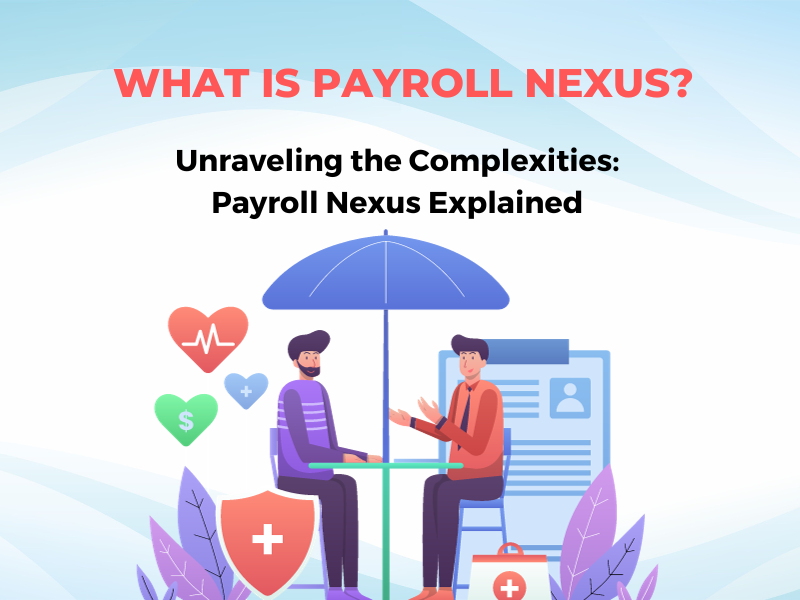Understanding Payroll Nexus: Essential Information & Requirements
As remote and hybrid work becomes more prevalent, companies with staff operating across various states must be well-versed in the payroll nexus regulations specific to each state or region where their employees or businesses function.
In this piece, we’ll delve into the effects of payroll nexus regulations on your business’s tax and payroll records, while providing advice on adhering to state-defined limits, reporting duties, and beyond.
What is Payroll Nexus: Key Standards & Accounting Responsibilities
Nexus payroll policies describe the relationship between your enterprise and the state or even city taxes in areas where your business functions. These policies determine if you must withhold taxes for a specific state or city. Essentially, it asks: Does your business have a significant presence in a particular area to necessitate tax contributions there?
When an employee of yours resides or works in a different state, your company might have to deduct income taxes based on that state, regardless of whether they actually work there.
Moreover, if your employees operate across several states, it can add layers of complexity to payroll accounting. This involves detailed calculations of time and taxes for each state where revenue-generating activities take place, especially if there’s no reciprocity agreement between the states.
In numerous states, a W-2 employee working remotely from a different state than the company’s main office establishes a nexus, irrespective of the number of hours they work weekly or monthly.
An increasing number of states are adopting numerical limits related to sales, property, or wages paid within a tax cycle to decide if an external business falls under their state and/or local income tax obligations. This criterion, referred to as the factor presence nexus standard, sets boundaries for determining nexus in certain regions. However, numerous states retain the right to define a nexus even outside these specified numeric benchmarks.
Nexus Payroll Requirements by State
At present, fifteen states adopt a sales value criterion for determining economic nexus. Meanwhile, an additional twenty-eight states establish business nexus based on transaction counts combined with benchmarks related to sales, property, or payroll.
States have different thresholds that determine whether a business has a substantial nexus and must therefore collect sales tax. In Ohio, for instance, a substantial nexus is established if a business has payroll of $50,000 or more in the state, property valued at $50,000 or more, or gross receipts of $500,000 or more from Ohio sales. Another threshold is if 25% or more of a business’s gross receipts, total payroll, or total property comes from Ohio. These threshold values are not uniform across all states, as they can vary between states and are sometimes adjusted annually by states to account for inflation and other economic factors.
Therefore, businesses need to be aware of the specific nexus standards that apply in each state where they conduct sales.
Tax Considerations for Remote Employees, Freelancers, and Other Off-Site Workers
Ensuring tax compliance for remote, hybrid, or part-time workers can be difficult for businesses due to varying payroll nexus rules. Generally speaking, whether a remote employee works part-time or full-time does not affect nexus requirements – if they are a W-2 employee telecommuting to conduct business out-of-state, it often automatically establishes nexus.
Regulations differ between locations but as a baseline, businesses must consider how their remote work arrangements may create nexus regardless of an employee’s work hours or status. Managing these requirements across different jurisdictions presents an ongoing challenge for companies committed to full tax compliance.
Likewise, if a hybrid or hybrid-at-will employee spends as little as one week per month working from an out-of-state home office, this arrangement could trigger nexus in many locations due to their rules.
Regarding independent contractors, a nexus may form if they work remotely but represent the company as a consultant, undergo training, or fulfill installations out of state. Completing sales of products or services while residing elsewhere can also create nexus in many jurisdictions for an independent contractor working on behalf of an out-of-state business. In all such situations involving remote or hybrid work configurations, businesses need to carefully consider potential nexus implications.
Ensuring ongoing compliance with Evolving Nexus Rules for Hybrid and Remote Employment
Given evolving workforce structures and regulations, it is critical for businesses, especially those with many hybrid staff, contractors, or large e-commerce operations, to enlist expert help navigating applicable nexus rules.
Proper guidance tailored to a company’s workforce, sales activities and relevant local/state standards can ensure compliance with withholding requirements to avoid penalties from tax authorities for inaccuracies or other violations. As regulatory landscapes continue adjusting, seeking specialized support is key for businesses to manage tax obligations associated with remote operations successfully amid changing compliance landscapes.
Leave Payroll Worries Behind with VantagePoint’s Guidance
Regardless of your workforce structure or revenue sources across jurisdictions, our payroll solution can assist with efficiently meeting your needs.
From remote employees to multi-location sales, VantagePoint’s solution streamlines processes while helping ensure lawful compliance now and into the future. Get in touch with us to discover how we simplify payroll management tasks and provide long-term legal compliance.
Sign up for our newsletter to receive timely updates on HR best practices, evolving labor rules, and other impactful information as you build and support your team. Staying informed of changing regulations is key to maintaining compliance – we’ll deliver the insights you need straight to your inbox.


